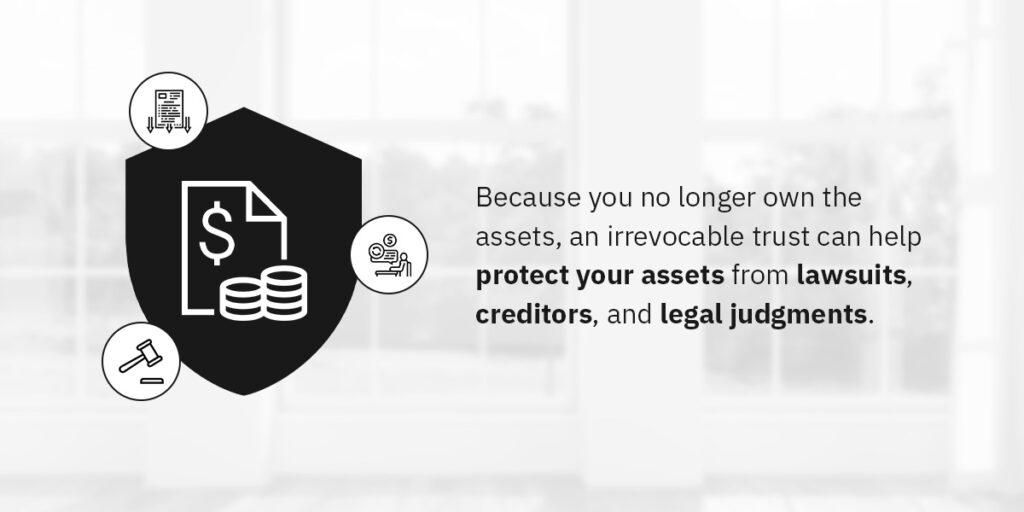How to Protect Your Assets


You’ve dedicated years to building your wealth and securing a comfortable future for yourself and your family. But unexpected lawsuits, creditors, or even divorce could put your hard-earned assets at risk. True financial security depends on preserving the wealth you’ve built. This guide will walk you through the essential asset protection and estate planning strategies you should know to guard your wealth for years to come.
Why Secure Your Assets?
Asset protection means legally structuring your assets to make them less susceptible to future claims. These claims could come from divorce proceedings, creditors wanting debt repayment, or lawsuits from incidents like car accidents, business disputes, or personal injury claims on your property. Asset protection also involves planning for any long-term care costs, which could otherwise drain your lifetime savings. We’re all vulnerable to risks like these, making asset protection an essential part of financial planning.
Asset Protection vs. Fraudulent Transfer
Legitimate asset protection strategies comply with laws against fraudulent conveyance or fraudulent transfer. These laws mean you may not protect assets by transferring them after a claim has arisen or you have been sued. Courts can void and reverse these fraudulent transfers and impose penalties. Instead, the key is to be proactive by establishing your asset protection strategies and structures before a claim arises — that way, your assets are not vulnerable to claims in the first place.
4 Ways to Protect Your Assets
Here are four asset protection methods everyone should know. A financial advisor can help you create the right strategy, drawing on these and other solutions to meet your unique needs. Take advantage of our advisor match tool here to get connected with an advisor at Fort Pitt Capital Group.
1. Insurance
Start with adequate insurance coverage. We believe an umbrella liability policy is a cost-efficient way to add millions of dollars in liability coverage on top of your existing home and auto policies, protecting your assets from large personal injury claims. A financial advisor can help you understand how much coverage you need and choose the best policy.
2. Protected Accounts
Take full advantage of legally protected retirement accounts. Federal laws like the Employee Retirement Income Security Act provide significant protection for 401(k)s and individual retirement arrangements (IRAs), with bankruptcy protection up to $1,711,975 for IRAs, while employer-sponsored plans receive unlimited protection.
3. Business Entities
If you own a business, structuring it as a limited liability company or corporation creates legal separation between personal and business liabilities. This means that if the business is sued, your personal wealth is more likely to be safe.
4. Irrevocable Trusts
Trusts are a cornerstone estate planning and asset protection tool, but not all trusts are created equal. We believe that for robust asset protection, one should use an irrevocable trust. When you transfer assets into an irrevocable trust, you legally relinquish ownership and control. The trust becomes the owner of the assets, and you appoint a trustee to manage them according to the terms you set.

Because you no longer own the assets, an irrevocable trust can help protect your assets from lawsuits, creditors, and legal judgments. Certain types, like Domestic Asset Protection Trusts (DAPTs), are designed for this purpose.
DAPTs even allow the creator to be a beneficiary, but this trust type is not allowed in all states, so consult a financial advisor to check whether it is available to you. In most other cases, you may not make yourself a beneficiary of the trust, but you can enjoy strong indirect control over the assets in it by setting the terms and choosing the trustee.
An irrevocable trust differs from a revocable living trust. While it is a good estate planning tool for avoiding probate after you pass away, a living trust does little to protect assets from lawsuits or creditors during your lifetime. Because you retain control and can revoke the trust at any time, the law considers the assets to still be yours and therefore vulnerable to claims against you.
Advanced Asset Protection Strategies
If you have significant wealth or complex assets, a financial advisor can recommend more advanced strategies. For example, you can use family limited partnerships (FLPs) or multimember LLCs to hold assets like real estate or investment portfolios and create a legal barrier.
If a creditor obtains a judgment against you, their remedy may be limited to a charging order. This gives them the right to receive distributions made to you, but it does not give them voting rights or the ability to force a sale of the assets within the entity. This makes the assets unattractive to creditors and can encourage a more favorable settlement.
Should We Put Assets Under One Spouse’s Name?
Moving assets to one spouse’s name as an asset protection strategy is usually misguided. If you move the assets to one spouse after learning about a claim against the other spouse or when you already have reason to anticipate that a claim will arise, a court may consider this a form of fraudulent transfer and reverse it with penalties.
If you want to have assets under one spouse for asset protection reasons, seek advice from a financial advisor to ensure you do this with the right proactive strategy in place. That said, these transfers can have other unintended consequences, like losing control over your assets in a divorce.
How to Protect Your Assets in a Divorce
If you are navigating a divorce, consult a financial advisor to discuss strategies for protecting the assets you brought into the marriage or acquired separately. The best way to protect your assets in a divorce is to have a proactive strategy in place long before either party files for divorce. A prenuptial or postnuptial agreement is one of the most effective tools. These legal contracts allow a couple to define which assets are considered separate property versus marital property, which would be subject to division upon divorce.
Properly titling when acquiring assets is also crucial. Assets held in your individual name may be treated differently from those held jointly. Another proactive solution is to place assets into an irrevocable trust before issues arise, protecting them from being classified as marital property.
Secure Your Assets With Our Help
Our experienced financial professionals are committed to putting your interests first, whether we’re providing financial advice or sharing informative resources like this guide. We understand that protecting your hard-earned wealth requires comprehensive planning that considers legal structures, insurance strategies, and proactive risk management.
We work with families to build financial legacies designed to last, drawing on our knowledge of recent legal developments and asset protection strategies. Our approach is rooted in trust, with a steadfast commitment to your family’s unique needs and circumstances. We believe in transparent guidance that empowers you to make informed decisions about your financial future and legacy.
Protecting your assets is crucial for your financial future and your legacy. Proactive asset protection strategies can help guard your wealth against creditors, lawsuits, and divorce. But the right asset protection strategy depends on your unique circumstances and the legal options available in your state. An experienced financial advisor can help you understand these options and choose your ideal solution.
Connect with a financial advisor today to discuss your asset protection goals.
Disclosures
Kovitz Investment Group Partners, LLC D/B/A Fort Pitt Capital Group is an investment adviser registered with the Securities Exchange Commission under the Investment Advisers Act of 1940 that provides investment management services to individual and institutional clients. SEC registration does not constitute an endorsement of the firm by the Commission nor does it indicate that the adviser has attained a particular level of skill or ability.
The information included herein may contain statements related to future events or developments that may constitute forward-looking statements. These statements may be in the form of financial projections and may be identified by words such as “expectation”. “anticipate”, “could”, “estimate”, “will”, “should” or similar terms. Such statements are based on the current expectations and certain assumptions of the author and are, therefore, subject to certain risks and uncertainties.
The description of products, services, and performance results of Fort Pitt Capital Group contained herein is not an offering or a solicitation of any kind. Past performance is not an indication of future results. Securities investments are subject to risk and may lose value.


